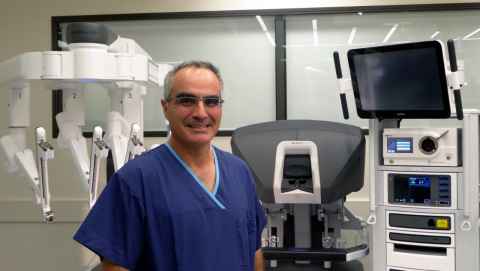Māori and Western worlds in surgery: a lifelong balance
10 October 2023
Professor Jonathan Koea's inaugural lecture will unveil the intersection of Māori culture and surgical expertise.

A distinguished surgeon and passionate advocate for Indigenous health, Professor Jonathan Koea, of Ngāti Mutunga and Ngāti Tama descent, has dedicated his life and research to bridging the gap for Indigenous health, particularly in surgery.
Hailing from Taranaki, Jonathan embarked on his remarkable journey at the University of Auckland's School of Medicine, entering through the Māori and Pacific Admission Scheme (MAPAS) in 1982. At that time, he was one of only eight pioneering individuals to bridge the divide between traditional Māori values and the world of Western medicine.
“Nowadays, I’m seeing a lot more Māori coming through which is very special to see,” he says.
“The ‘80s were an interesting time in Auckland. I arrived in 1982, just after the 1981 Springbok tour. It was quite politicised and many of the important issues to progress for Māori were still underway, such as kura kaupapa, Te Reo Māori, discussions about land reparations and raupatu."
Fast forward to 2023 and the position of these two worlds remains as relevant as ever. It's this very fusion that will inform Jonathan’s inaugural lecture on 11 October at the University's Grafton Campus.
In the same way Māori contribute to many fields,
Māori certainly have a taonga they can bring to surgery too.
Titled, "Ki te whakataurite ki ngā ao e rua? Balancing two worlds?", the lecture will dive into the lifelong work of a Māori surgeon, with a focus on balancing worlds (Māori and non-Māori), surgery, and clinical research.
"Te Ao Māori and surgery are not commonly associated by either Māori or non-Māori and the challenges in reconciling Western and Māori world views currently confront Aotearoa New Zealand like never before," Jonathan says.
“But there is a need for more Māori surgeons. In the same way Māori contribute to many fields, Māori certainly have a taonga they can bring to surgery too.
“Right through my whole career, even though I've been a surgeon and done acute surgery, I've tried to have a research output and a lot of what I’m interested in are the questions around disparity and health service provision issues with cancer.”
After completing General Surgery training in Aotearoa New Zealand, Jonathan undertook post fellowship training in surgical oncology and hepatobiliary and pancreatic surgery at Memorial Sloan-Kettering Cancer Centre in New York City.
He is President Elect of the Australian, Aotearoa New Zealand Hepatopancreaticobiliary Association, an examiner for the Royal Australasian College of Surgeons, the subspeciality editor for HPB Surgery for the ANZ Journal of Surgery, a Trustee of Hei Āhuru Mōwai, and works in an advisory role for Te Ahu o Te Kahu.
Jonathan maintains a research programme in the fields of HPB Surgery, gastrointestinal cancer and Indigenous health, and has a focus on increasing numbers of Māori entering surgical careers.
Lecture details
Date: Wednesday 11 October
Time: 5.30-7.30pm
Venue: Lecture Theatre 505-007, Grafton Campus
RSVP here
Media contact
Te Rina Triponel | Kaitohutohu Pāpāho Māori
E: te.rina.triponel@auckland.ac.nz